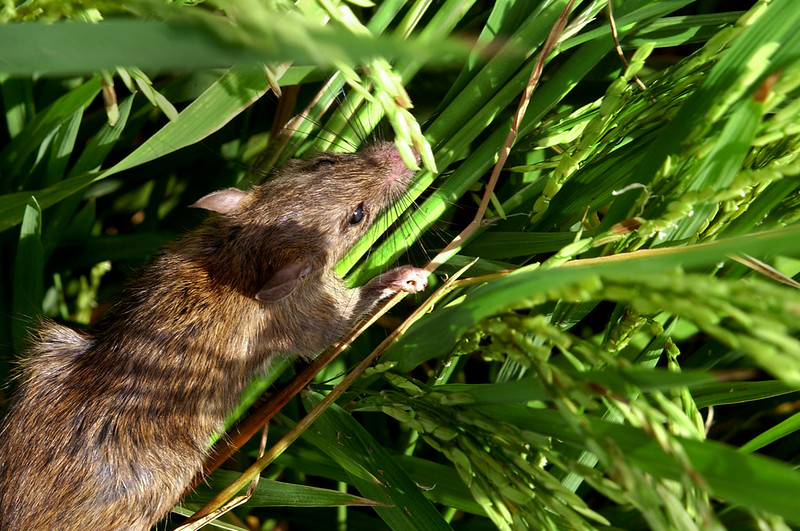In the first such study in Sri Lanka, we identified the main rodent and shrew species and the extent of post-harvest damage caused in rice storage facilities of smallholder farmers based on systematic trapping and estimated related damage to rice in typical smallholder storage facilities in the three main agro-ecological zones in Sri Lanka.

(Photo: IRRI)
.
The mean cropping area of smallholder farmers in Sri Lanka is less than two hectares. In their rice storage facilities, which are often attached or in close proximity to the houses where farmers’ families live, close contact between rodents and people is likely to increase the risk of transmission of rodent-borne pathogens to humans and livestock. In Sri Lanka, such pathogens include Leptospira species that can cause deadly disease in humans.
Anecdotal evidence suggests that rodent damage in storage facilities is a chronic and serious problem of rice cultivation in Sri Lanka in various locations. The losses hamper food security and, therefore, advice on rodent management is urgently required. However, for Sri Lanka, there is little published about the rodent species present in rice storage facilities of farmers, and, to our knowledge, nothing on the amount of damage caused by rodents in storage. There is one publication that mentioned that B. bengalensis has the highest potential to damage rice in Sri Lanka.
Without a thorough knowledge of the composition of small mammal species in storage facilities and of the extent of damage caused, there is a weak foundation to develop evidence-based management strategies. Measures need to be aligned to the pest species present to identify the optimal timing to intercept immigration to fields or to storage facilities. Suitable and effective management is required to reduce damage and to determine if the extent of damage justifies the cost of specific actions.
In the first such study in Sri Lanka, we identified the main rodent and shrew species and the extent of post-harvest damage caused in rice storage facilities of smallholder farmers based on systematic trapping and estimated related damage to rice in typical smallholder storage facilities in the three main agro-ecological zones in Sri Lanka.
The latter included a trial to use netting to prevent small mammals from consuming stored rice. The findings will aid the development of management tools that can help to improve food security by reducing post-harvest rodent damage and possibly mitigating the risks of rodent zoonoses for rice farmers in Sri Lanka.
In the storage facilities, the most common species at all agro-ecological zones in all seasons were R. rattus, Bandicota indica, and the mainly insectivorous small mammal Suncus murinus. R. exulans was rare (1% of total number) and did not occur in the intermediate zone. Mus booduga was trapped only in the wet zone while B. bengalensis was trapped only in the intermediate zone.
They cause considerable damage to stored rice. The losses clearly justify action to enhance food security and effective rodent management also is required to protect the health of humans and livestock from rodent-borne pathogens. At the infestation present in this study, losses and contamination of stored rice can be substantially reduced by covering rice bags with a double layer of fishnet with a mesh size of 1.5 × 1.5 cm.
The population and breeding ecology of the relevant rodent species and other relevant aspects need to be studied in more detail to develop and field test suitable ecologically-based rodent management (EBRM) approach for the Sri Lankan agro-ecological zones that combine post-harvest and pre-harvest crop protection.
EBRM includes a suite of techniques based on sound knowledge of the target rodent species as well as ecological, social, and economic aspects. This should consider the Buddhist culture where killing mammals is usually not tolerated.
The development of tailor-suited strategies to improve the control of rodents is worthy of further support given their considerable positive impact on the food security of smallholder farmer families in Sri Lanka and other regions such as southeast Asia and eastern Africa.
Read the study:
Htwe NM, Sarathchandra SR, Sluydts V, Nugaliyadde L, Singleton G, and Jacob J. (2021) Small mammal communities, associated damage to rice and damage prevention in smallholder rice storage facilities in Sri Lanka,
Crop Protection, Volume 145: 105638.







